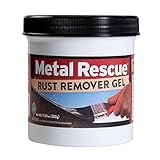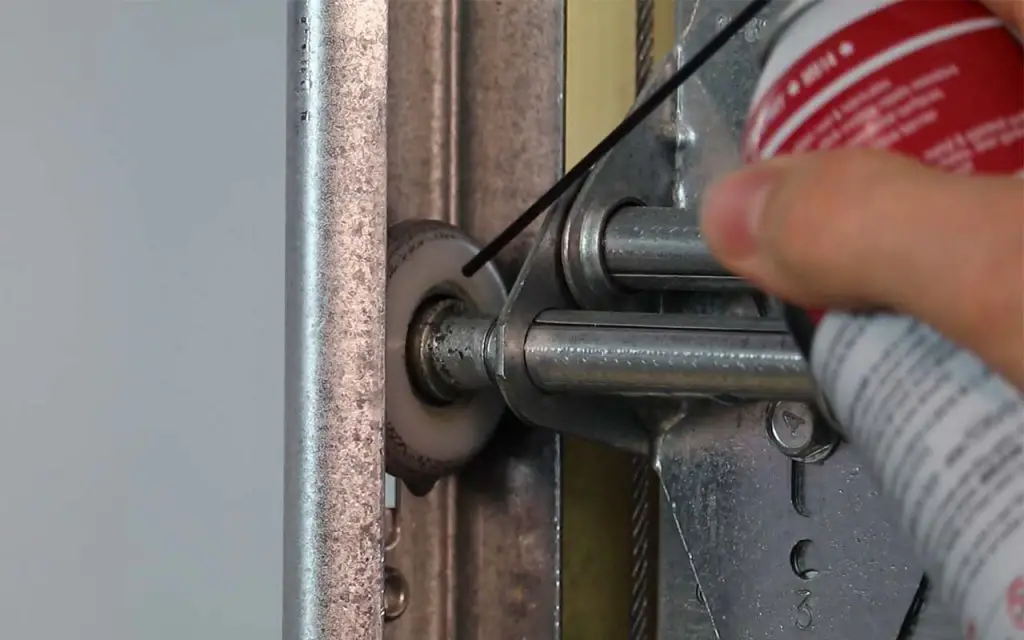The issue of garage door rust is common in almost every metal garage door. The unpleasant rusty look can become a long-term problem if not treated on time.
Untreated door rust can begin to create holes in the garage door. The rainfall and moisture can easily seep into the garage door, creating other unavoidable problems such as spring and rail damages. The only solution you’d be left with is the costly garage door replacement.
Most modern garage doors are made up of sturdy metal material and coated with a waterproof coating. However, rusting can begin in all kinds of metal doors if they aren’t protected well.
Our Top Garage Door Opener Rust Remover
Table of Contents
| Image | Title | Price | Buy |
|---|---|---|---|
 | Rust911: Makes 2-gallons of Rust Remover Concentrated Dissolver | Economical, Safe-to-Use and Powerful Oxidation Treatment Soak Rescue Cleaner for Cast Iron, Steel, Copper -16 oz Ultra Concentrate | Buy Now | |
 | Evapo-Rust The Original Super Safe Rust Remover, Water-Based, Non-Toxic, Biodegradable, 1 Gallon,Gray,ER012 | Buy Now | |
 | Workshop Hero WH003227 Metal Rescue Rust Remover Gel, 17.64 fl. oz, 1 Pack | Buy Now | |
 | WD-40 Specialist Rust Remover Soak, One Gallon | Buy Now | |
 | POR-15 40701 Rust Remover, 1. gallons | Buy Now |
Why is my garage door rusting?
Heavy-duty trucks, suspension bridges, metal garage doors, fences, etc., are common prey to rust. There are many reasons why a metal garage door will start rusting. Mostly it is the surrounding environment that multiplies the effect of metal oxidation. Other times, it can happen because of poor metal quality, primer, and paint material.
- Dissolves and removes rust easily so you can restore your surface
- Makes your surfaces paint ready
- Safe for use on metals, ceramic, porcelain and glass
- Minimal tools needed for rust removal
- Citrus powered
Prices pulled from the Amazon Product Advertising API on:
Product prices and availability are accurate as of the date/time indicated and are subject to change. Any price and availability information displayed on [relevant Amazon Site(s), as applicable] at the time of purchase will apply to the purchase of this product.
Here are some of the reasons why your garage door starts rusting.
- Your neighbor will mostly determine the reason for your garage door rust. Places that are closer to water sources can experience excess moisture. Houses near saltwater like the sea or ocean can face salt corrosion that leads to garage door rusting.
- Homes near industrial areas can see quick garage door rusting. So does the metal garage door near the street where excess salt is used for de-icing during winter?
- Places that witness a lot of rainfall can often see garage door rust when the water starts seeping into the corrupt metal unit or under the flimsy paint.
- The application of paint can determine the garage door rust. Most metal garage doors with a single coat of paint can witness water seeping inside the paint layer during heavy rainfall.
- Rusting is most common at the bottom of the door where rain, snow, and corrosive materials like salt get collected.
- If your garage door surface has been damaged, it may have small cracks on the paint, primer, or metal itself. In this case, the extra galvanization and protective coating are almost useless in preventing your garage door from rusting.
- Occasional cleaning of the garage door is important to ensure that corrosive materials like dirt, dust, oil, ice, salt, and grime don’t build up over time. These can start eating into the paint and primer and slowly open the small crevasses for water to seep in.

How to remove garage door rust easily?
Garage door rust is created by oxidation. The key to preventing your garage door from rusting is stopping the oxidation process that is occurring.
It’s hard to notice early signs of oxidation because the small rust dots are hardly visible to the eyes. It only becomes visible when you start noticing the peeling off of paint, bending the metal surface, and eerie noises appearing while opening and closing the door.
Remove Garage door rust with the following steps
When you take the proper steps to remove the rust, you can save a lot of time and money on professional cleaning or garage door replacement.
- Close your door completely. Make a bucket full of dish soap and warm water solution. You can use regular soapy water to clean your door. Dish detergent works well since it usually has a degreasing agent in it, such as lime.
- Use a large sponge and rag cloth to scrub the surface. Clean off any accumulated dirt, pollen, or other debris stuck to the garage door. Be careful about using a sharp object to scratch off the dirt as it often ends up scratching off the paint and primer off the door. Wipe the door clean.
- You need not use a high-pressure water hose to wash your door. Your regular hose with a moderate shower or spray setting will do needful.
- Next, fill a small container with white vinegar.
- You can use a slightly corrosive material to scrub the rusty areas. Be careful about using a steel wool pad. You can use an old toothbrush to scrub the rust by dipping it into the vinegar solution.
- If the rust is persistent, you can grab a small piece of sandpaper and start scrubbing on the rusted area.
- The rust will come off by now. The next step is to redo the garage door paint to make it look even. Use a paintbrush to coat the sanded areas with a zinc-chromate primer. The primer acts as a strong barrier between the metal and paint.
- Let the primer dry thoroughly. In the end, you can use spray paint to color the garage like new.
- When repainting the garage door, make sure you paint the whole garage door but a small section.
The Association of North American Garage Door Manufacturers levies strict guidelines requiring a coating of zinc to galvanize and protect the metal from rust. Moreover, it should be topped with a primer and baked-on paint layer to keep it waterproof, moisture-proof, and rust-resistant.
What is the best rust remover?
Most commercial rust removers work well on any metal surface that experiences rust. You can rely on rust removers that attack the oxidation without harming the base material.
According to CNet.com, this is the comprehensive list of the best commercial rust removers in the market.
- Rust 911 Ultra Concentrate– Rust 911 is a concentrated formula that is non-toxic, non-flammable, and biodegradable.
- Evapo-Rust– Evapo-Rust is a fast-acting, non-corrosive, and non-toxic rust remover. It’s guaranteed to remove rust without harming the copper, brass, aluminum, and rubber surfaces.
- Metal Rescue– It’s a concentrated formula that is water-based, non-corrosive, and safe to use. Wear protective gloves and eyewear before using them.
- WD-40 Rust Remover Soak– It’s a super safe and non-toxic rust remover. It can be reused over and over.
- POR-15 Rust Remover– It’s an iron oxide-dissolving solution that contains phosphoric acid. Be careful about using it without wearing gloves or eye-protectant. A gallon of POR-15 Rust Remover can eliminate rust from up to 300 pounds of heavily oxidized steel.
